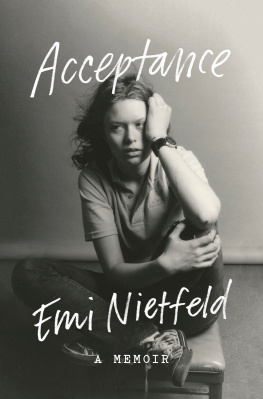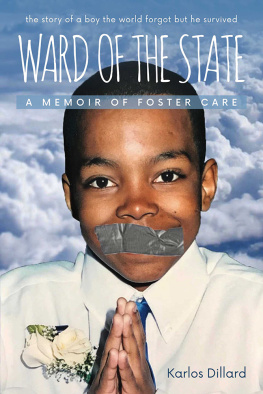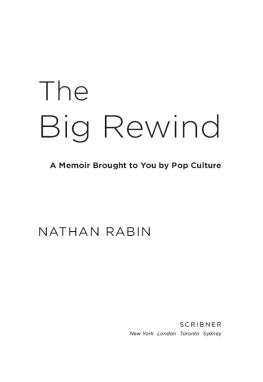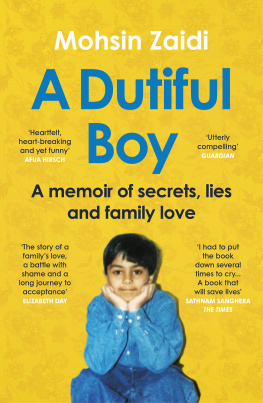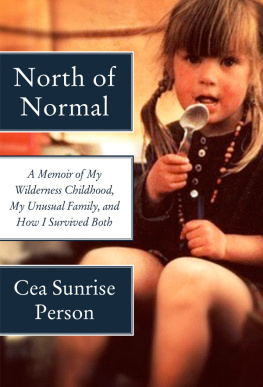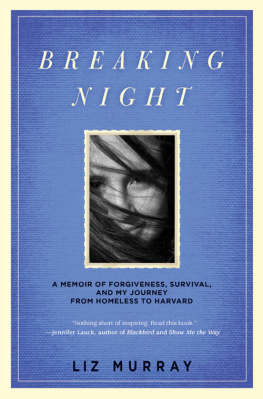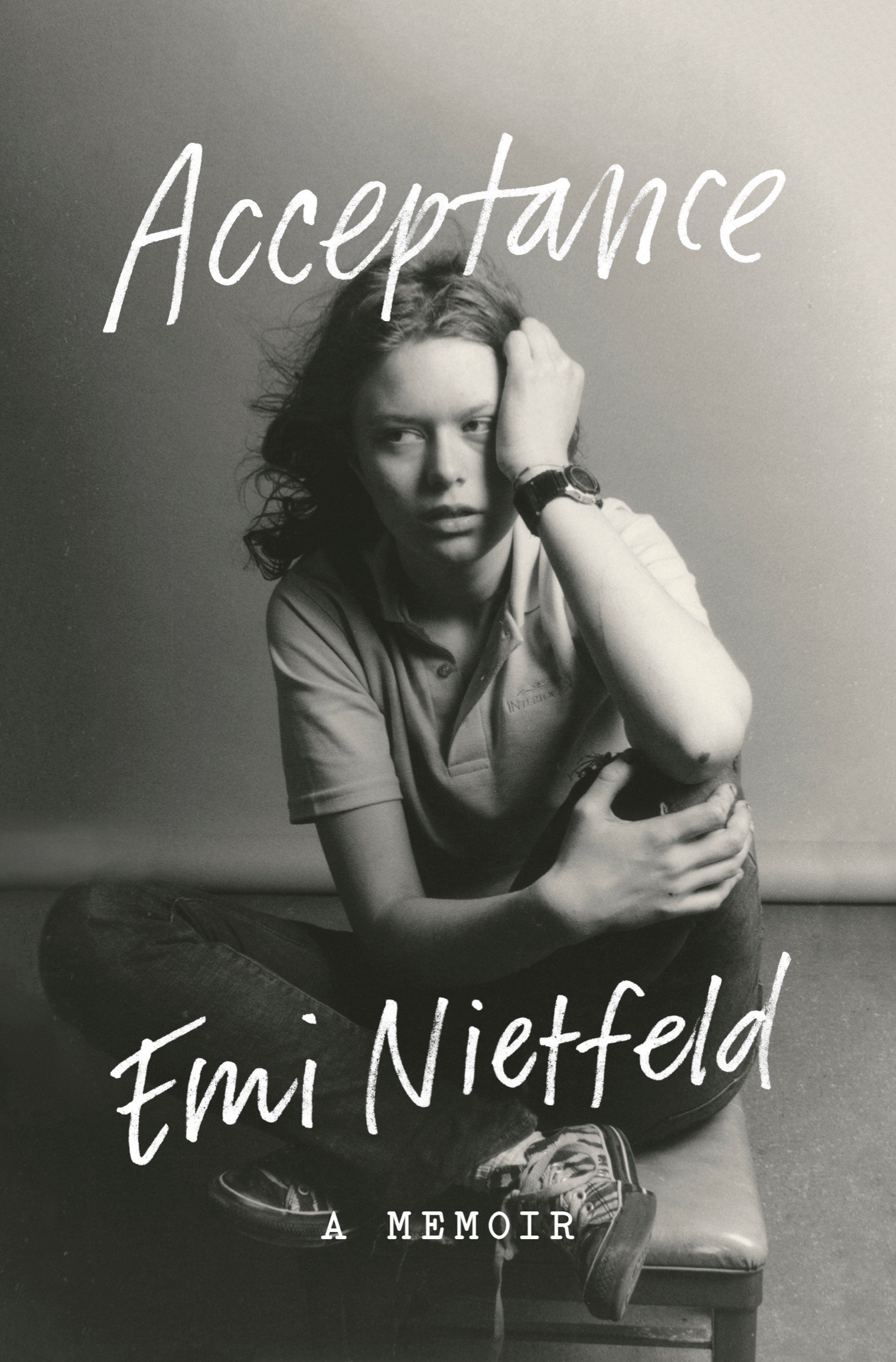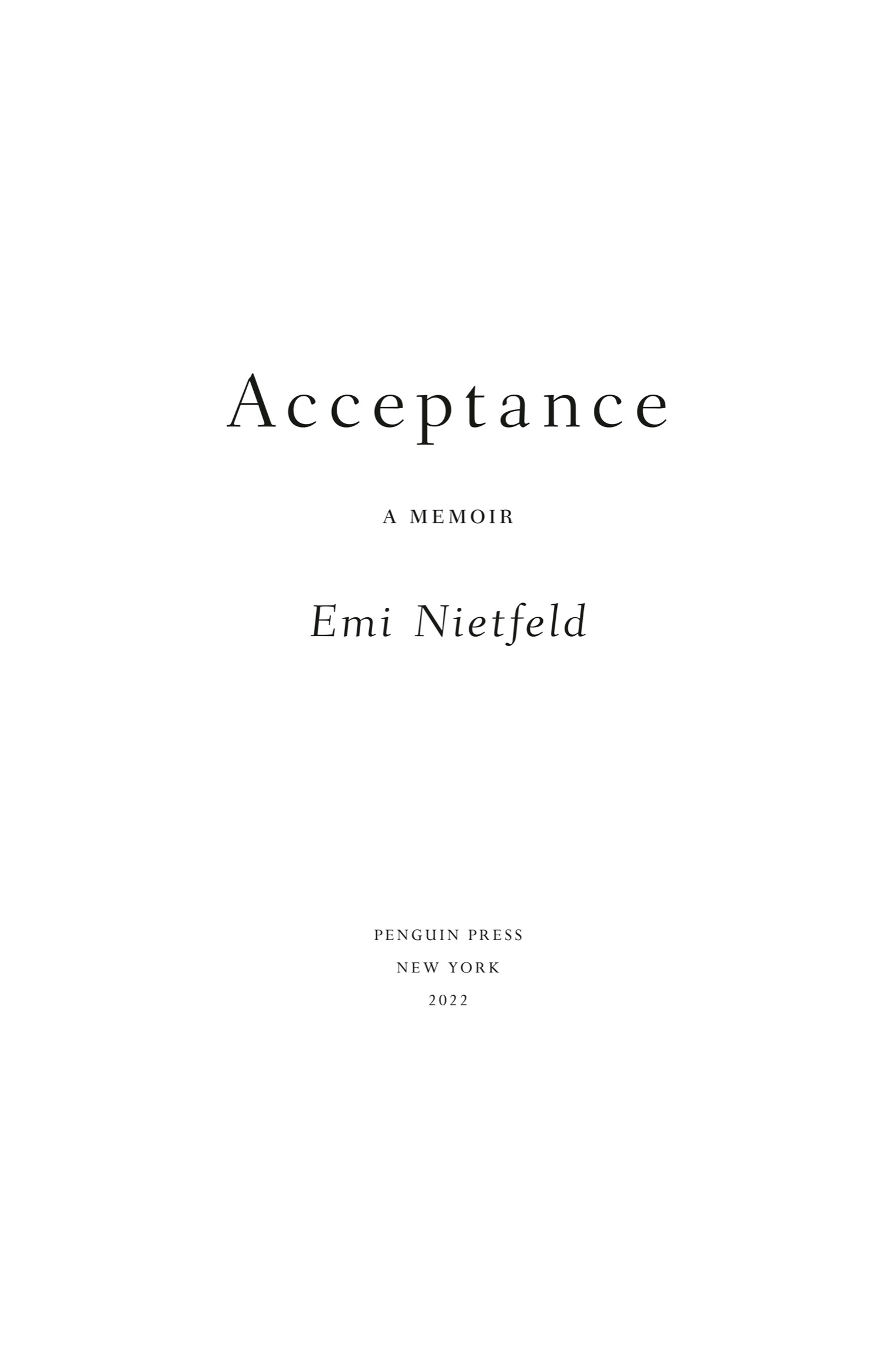Penguin Random House supports copyright. Copyright fuels creativity, encourages diverse voices, promotes free speech, and creates a vibrant culture. Thank you for buying an authorized edition of this book and for complying with copyright laws by not reproducing, scanning, or distributing any part of it in any form without permission. You are supporting writers and allowing Penguin Random House to continue to publish books for every reader.
Portions of the material on appeared in different form as Self Portrait as a Human Interest Story in Longreads, December 19, 2019. Copyright 2019 by Emi Nietfeld.
Names: Nietfeld, Emi, author.
Title: Acceptance: a memoir / Emi Nietfeld.
Description: New York: Penguin Press, 2022.
Identifiers: LCCN 2021046322 (print) | LCCN 2021046323 (ebook) | ISBN 9780593489475 (hardcover) | ISBN 9780593489482 (ebook)
Subjects: LCSH: Nietfeld, Emi. | Foster childrenUnited StatesBiography. Child welfareUnited States. | Social mobilityUnited StatesPsychological aspects
Classification: LCC HT612 .N54 2022 (print) | LCC HT612 (ebook) | DDC 305.5/130973dc23/eng/20211117
Introduction
One week before my fiancs parents met my mom, I paced across my living room, figuring out what to tell them. Do I have to say anything? I asked Annette, my mentor from high school, over the phone. I prayed that my mom would show up showered and park far enough away that they wouldnt see the trash piled to the ceiling of her minivan. Maybe then theyd see the parent I loved, whod snuck me to figure drawing classes while I was in foster care, whod taken me to the library to study after the residential treatment counselors confiscated my books, whod driven me from Minneapolis to Washington, DC, just for a photo exhibition.
What have you told them? Annette asked.
I bit my lip and stared out at the ginkgo trees outside my apartment in New Yorks West Village. I said I went to boarding school. Thats what I always say.
Emi, youre getting married in a month.
Seven weeks. Even this seemed too soon; Id hoped the families would introduce themselves at the rehearsal dinner, pose for a picture after the ceremony, and then never see each other again. I wanted my future in-laws to believe that Id always been destined for an elite university and a New York Times wedding announcement, not the truth: that Id slept in my car while writing my college applications. Perhaps Byrons parents had sensed my deceptiontheyd bought themselves plane tickets to my hometown the same week wed be there finalizing details.
And they never asked about your family, how you grew up, anything like that? Disapproval leached out of my mentors voice. I imagined her stern face, pale skin harsh against her dark hair. I felt like a teenager all over again.
But what did Annette think I would have told them? When I vented about my moms hoarding and about how shed had me medicated, letting the doctors believe I was dramatic and delusional rather than admitting her own problems, Annette would say, Shes sick, Emi. For years, the idea of having a normal adulthoodlet alone the intellectual life Id cravedhad seemed absurd. Yet Annette chided, Let sleeping dogs lie. Of course I hadnt told my future in-laws anything.
I think maybe they should just meet her, I offered. Make their own first impression.
No. You absolutely cannot do that. You need to call Byrons mother right away. You have to give them time to prepare.
Annette was probably right. What would my in-laws think if they expected someone normal, of modest means, and then met my mom?
Still, once we hung up, I sat on my Moroccan rug and searched for any excuse not to call. Saying anything felt like a betrayal. When I was growing up in Minnesota, my mom was the smartest person I knew, besides a few doctors. It was us against the provincial idiots. When I talked about my family, I described my brilliant half brother who never went to college and my mom who almost got into Stanford, whose life would have been so different if she had. She was the one person who had always believed in me and my Ivy League ambitions, even when that faith seemed untethered from reality. Didnt my in-laws deserve to see that version of my mom?
Did they really need to know that because of her, I knew what it meant to be desperate? I wanted to forget all the places Id slept, no one knowing where I was, always one step away from tragedy. All Id wanted growing up was to read books and study, but instead I learned how few acceptable ways there were to need help. You had to be perfect, deserving, hurt in just the right wayeven then, adults were so constrained in what they could offer. Everyone who dealt with disadvantaged kids, from therapists to college admissions officers, treated us as if we could overcome any abuse or neglect with sheer force of will. In the present tense, I was sick of pretending to be so resilient, so I preferred to keep my mouth shut.
But I rarely said no to Annette, the woman whod signed up to help out a struggling girl a decade ago. Even though I was twenty-five now, not fifteen, I still felt like my survival depended on keeping all the adults happy.
I dialed.
Hello? My mother-in-law-to-bes crisp enunciation scared the shit out of me.
Hi, Christine. I put on the voice I learned in college and made small talk. We talked about her latest run, that weekends chamber music concert, our upcoming date at the Met Opera.
I wanted to, um, share some information with you before you meet my mom. I read what Annette told me to say from a Post-it note: My mom is a compulsive shopper and hoarder. Its put a lot of strain on our relationship. I last lived at home when I was fourteen.
Once Id said it, I felt crazy that Id been with her son for four years. Four Thanksgivings, four Christmases skiing in Aspen, four New Years Eve tins of caviar, and they didnt even have this stripped-down version. But then again, my college friends didnt know. My colleagues assumed I grew up rich, next to a lake. Even Byron, with whom I planned to spend my life, had only the outline.
Id done everything I could to distance myself from that old world: moved to Manhattan, landed a fancy job, applied Retin-A fastidiously to remove the worry lines etched into my face, and shot my cheeks with Botox to soften my jaw, thickened from clenching. I worked out twice a day until my abs popped and woke up early even on the weekends. I basked in my apparent health and productivity, but Id organized my life so that I never had more than fifteen minutes free for everything Id overcome to come back to haunt me.
One week later, in Minneapolis, forty-five minutes after wed told my mom to meet us, I saw her and gripped Byrons hand. Hi, honey! she said, eyes brightening. Shed cleaned herself upher greasy hair still had comb marks through it. A billfold bulged out of her pocket, making her slacks stretch across her stomach and then sag over the wrinkled black leather of her mens tennis shoes. When she leaned in to hug me, must filled my nose. I have some things for you in the car.

